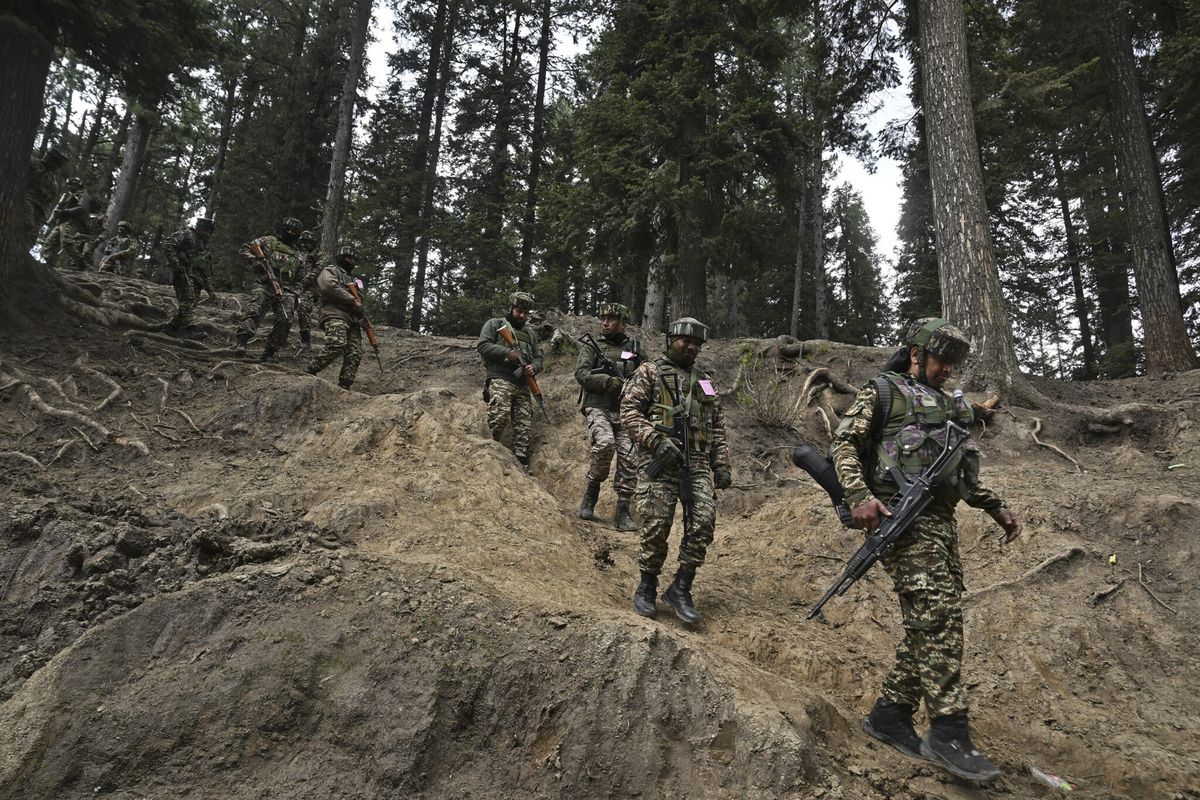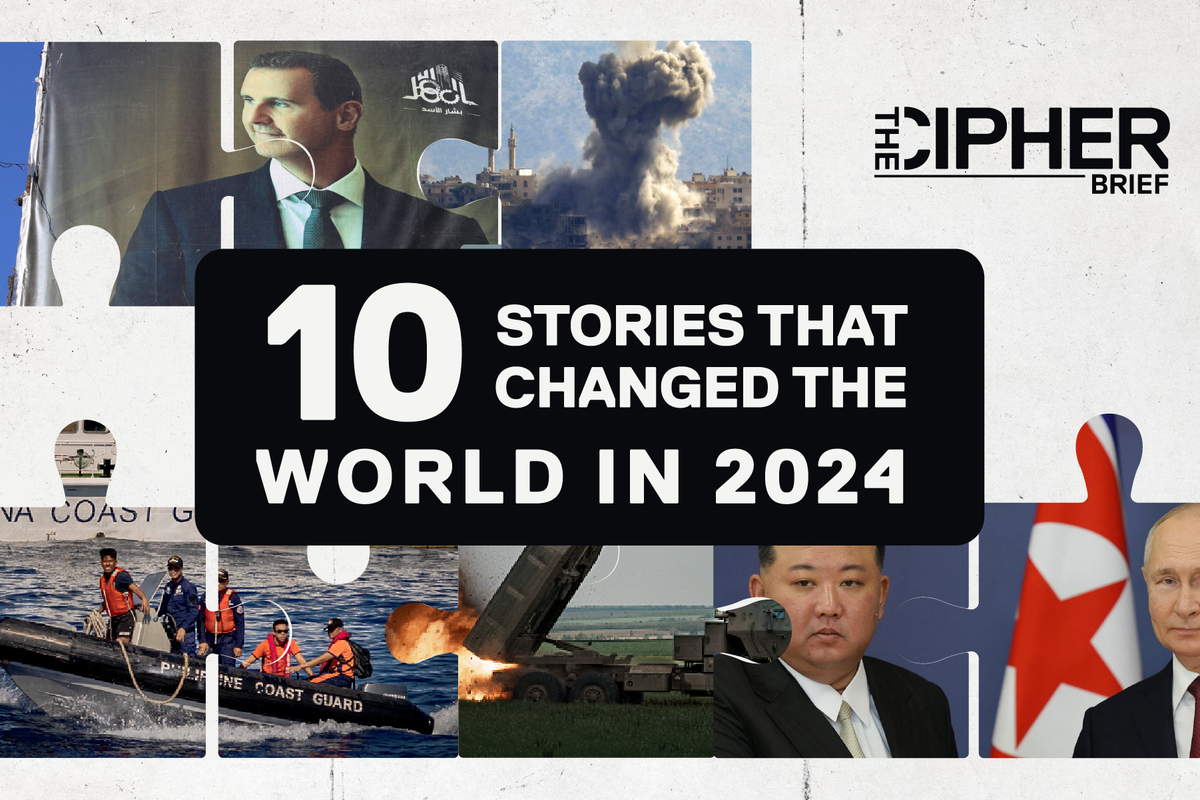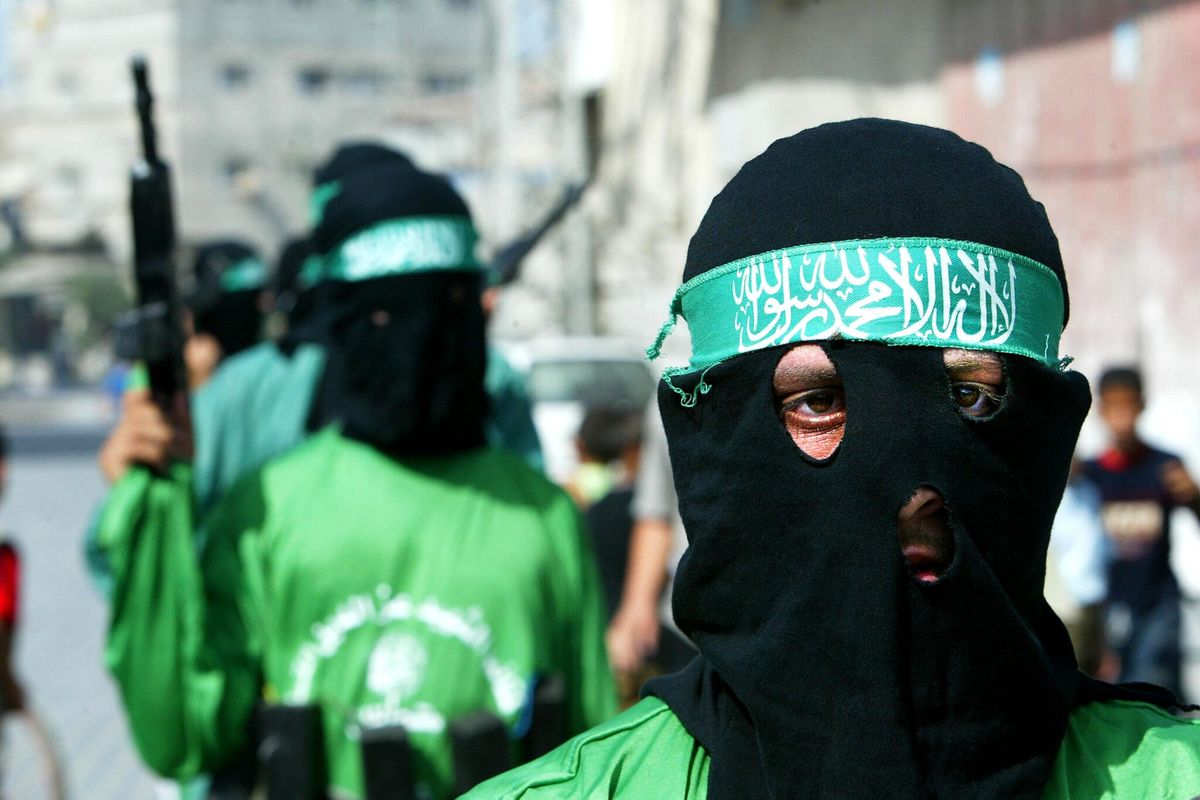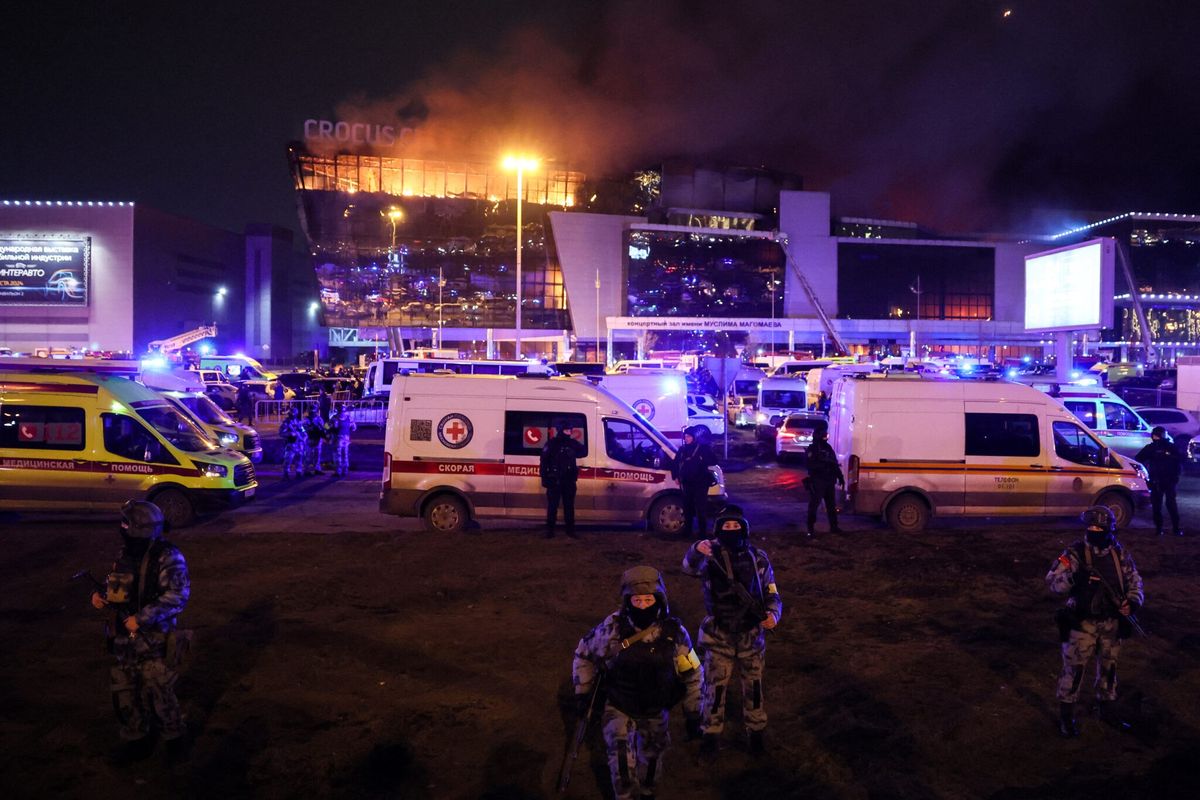SUBSCRIBER+ EXCLUSIVE REPORTING — The Olympic torch has landed in France, and begun its 69-day journey to Paris. It’s a milestone for the 33rd Olympiad, filled with reminders at every stop – from the French Riviera to the beaches at Normandy to the French capital – that these Olympics will come with an unprecedented threat of terrorism.
Two months before the opening ceremony, France is already on its highest level of alert, thanks to a resurgent Islamic State, a war in Gaza that many terrorism experts believe has inspired jihadists, and the Paris organizers’ ambitious plans to present an open face to the public. On July 26, rather than the traditional march of athletes into an Olympic Stadium, the games will begin with a nearly four-mile procession along the Seine River, with athletes entering Paris on boats, hundreds of thousands of spectators watching from special viewing stands, and Parisians and their guests looking on from their windows.
The idea is an opening ceremony that will “show France under its best light,” as President Emmanuel Macron put it in a recent interview, and “to show that we can do extraordinary things.” It will be, Macron said, a “moment of beauty, art, celebration of sports and our values.”
It might well be all those things, but it is also already presenting a nightmare for security officials.
Terrorism experts in France and elsewhere have enumerated a long list of risks – not least the fact that the Seine, which flows through the heart of Paris, is vulnerable to attacks from drones and snipers. The recent resurgence of the Islamic State and its affiliates — one of which carried out the mass shooting in Moscow in March that killed 140 people – has boosted anxiety and influenced a security plan that will shut down much of Paris in late July.
While France’s Interior Minister, Gerard Darmanin, has raised concerns about protestors disrupting the journey of the Olympic torch, demonstrations are far from the biggest concern.
“The most worrying threat is the terrorist threat, whether physical on the ground, or cyber actions,” Bertrand Cavallier, a consultant and a former commander at France’s national military police training school, told The Cipher Brief. “There will be a mobilization of all forces, not only in Paris or at the sites, but the entire French security system will increase in power, with the involvement of other actors such as the army, the air force, and others. It is really a level of mobilization that has never taken place in France.”
It’s also an operation that will last for months, from the travels of the Olympic torch to the July 26 opening ceremony, the 17-day Olympiad, and then on through the Paralympic Games, which end on September 8.
“We are on operations that are of a completely different nature, of a completely different dimension,” Cavallier said.
Welcome to Paris, in July 2024
If there was any doubt about the level of concern, the reception for the Olympic flame made it clear. The boat transporting the torch was met in Marseille by nearly 6,000 French troops, 16 snipers watching for potential dangers, and an AWACS plane monitoring from above.
Along the winding route from Marseille to Paris, the torch will be accompanied by two layers of security: a convoy of 200 officers and then, closer in, what the French are calling the “engagement convoy”, which will consist of 18 officers forming a protective bubble around the flame.
And that’s just for the Olympic torch.
The security plans for the opening ceremony – at least those that have been made public – look like this:
For eight days prior to the July 26 start of the games, the Seine will be closed to all navigation, with areas along both sides of the river designated a protected zone and closed to vehicle traffic. Roughly 20,000 people who live and work in that zone will need to apply for a special QR code if they wish to move to and from their homes.
On the day of the ceremony, the Paris airspace (broadly defined to include some 93 miles beyond the city) will be closed, as will all four of the city’s airports. Helicopters will hover above the city, crewed by officers trained in tracking and defusing drones.
And if sea and air and ground shutdowns weren’t enough, the Paris police will be busy securing the city’s tunnels and sewers, and shutting down all subway stations within the perimeter of the protected zone. They will do the same for all businesses and restaurants in that area.
All told, some 45,000 police and military police officers will flood the city and its suburbs. Roughly 100 divers will be looking for bombs, and 650 officers from anti-terrorist units will be deployed, along with more than 700 firefighters trained in detecting chemical attacks.
“There will be a gendarme or police officer every square meter,” Ghislain Réty, the head of one of the country’s antiterrorism units, told The New York Times. “A huge amount of intelligence work has been done. Honestly, I think it will be a beautiful party.”
That’s the hope.
When it comes to the games themselves, visitors will face a phalanx of security. All those French security services will be complemented by more than 20.000 private security guards and some 2,500 foreign officers, including some from the United States, many with bomb-detecting dogs.
Those who know Paris will understand the scope of precautions being taken along the city’s Metro system. The Tuileries and Concorde stations – two of the city’s most popular stops – will be closed and completely inaccessible from June 17 to September 21. The Champs-Elysées Clémenceau station is to close on July 1 and reopen on September 21.
For those who don’t know Paris well, suffice to say that getting around the city will be a nightmare for commuters and tourists alike.
Lastly, in a step that has drawn criticism, the French parliament has approved a bill that will allow the use of real-time camera systems supported by algorithms to spot suspicious behavior — the sort of technology China uses to monitor its citizenry – during the summer games.
Assessing the threat
France has become accustomed in recent years to terrorist threats, and attacks as well. A coordinated assault on the Bataclan concert hall and other Paris venues in November 2015 killed 130 people and wounded more than 400 others. Earlier that year, an attack against against the satirical newspaper Charlie Hebdo took 12 lives. It was that attack that ultimately persuaded Paris’s mayor, Anne Hidalgo, to campaign for the Olympic Games, as a way to show the city’s resilience.
ISIS-K, the group which carried out the Bataclan attacks in Paris as well as this year’s March 22 concert hall attack in Moscow, has made no secret of its interest in striking western targets. In recent months, intelligence agencies in Austria, France, Germany and the Netherlands say they have disrupted ISIS-K plots against their countries, and in the wake of the Moscow attack, the ISIS-affiliated al-Battar Media published a message threatening Italy, France, Spain and Britain, along with this question: “Who’s next?”
“What Moscow showed is when there’s any kind of complacency, terrorists see an opportunity or an open window to strike,” said Bruce Hoffman, a Cipher Brief expert and Senior Fellow for Counterterrorism and Homeland Security at the Council on Foreign Relations. “And terrorists being the consummate opportunists, they will always take advantage of whatever opportunities presented to them to strike in the West.”
Darmanin, the interior minister, told Le Parisien that the security services have recently foiled one planned attack every other month, and the paper said there are roughly 5,000 people on a government list who have been flagged for radicalization or possible links to terrorists.
“France has lived with the threat of terror attacks,” Bruno Le Ray, head of security for the Paris Olympic Committee and a former high-ranking military official, told Politico. "From the outset, all plans were built assuming that there would be a terrorist threat.”
Olympic concerns - and votes of confidence
Some experts believe France overstepped in its Olympic ambitions – particularly with the idea for a city-wide opening ceremony. Alain Bauer, a criminologist at the Conservatoire National des Arts et Metiers, used an interesting metaphor for the challenge.
“When you décide for the first time to climb Everest, you usually don’t add 50 kg to each leg just to show that you can do it,” Bauer told The Cipher Brief. “Police, intel and the Army are overwhelmed with duties and have to face a large variety of threats…particularly for the opening ceremony.”
Bauer said he worries most about the threat posed by small, low cost-drones and more broadly, the possibility that the organizing committee for the Paris games underestimated the security issues.
“Let’s hope for the best,” Bauer said.
The organizers insist that they have understood the risks from the beginning. Many noted France’s experience with terrorism and other serious disruptions – including large-scale protests at a climate conference and crowd control issues at the 2022 Champions League soccer final. And in one important vote of confidence, the U.S. Diplomatic Security Service, which oversees the safety of U.S. diplomats at large international events, reportedly expressed its satisfaction with the arrangements in place for the games.
To date, neither the threats nor the potential inconvenience appear to have dented enthusiasm for the Games. Some 206 international delegations have said they plan to participate in the opening, and 120 heads of state have indicated that they will be there. More than 10,000 athletes are due to participate, and Paris officials say they are expecting 13 million visitors for the games.
Olympic Plan B - and maybe Plan C?
Last month, Macron suggested for the first time that the opening ceremony might be moved away from the Seine. He said that if there were a serious terrorist threat, the government would be prepared to pull the ceremony off the river — and hold it either at Trocadéro Square or in the Stade de France, the national stadium.
The authorities have also cut by half the number of spectators — from 600,000 to roughly 300,000 – who will be permitted to watch from stands along the river. That move was reportedly made because of the perceived risk of a lethal drone attack. It wasn’t clear why such a threat would make it safe for the lower figure of spectators to attend.
In his interview with The Cipher Brief, Cavallier acknowledged that given the nature of the event and current global environment, the terrorist threat “cannot be reduced to zero, zero risk no longer exists.”
“I work every day to ensure that this opening ceremony is a moment of French pride,” Darmanin said in an interview with Le Parisien. “Terrorism can affect anyone, at any time. And ironically, as long as they are highly secure, major events are undoubtedly among the safest places.”
Again - that’s the hope.
Read more expert-driven national security insights, perspective and analysis in The Cipher Brief.













